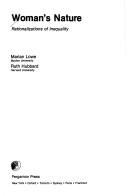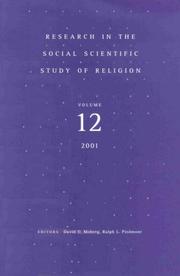| Listing 1 - 10 of 25 | << page >> |
Sort by
|
Book
ISBN: 9781483358949 Year: 2015 Publisher: Los Angeles London [etc.] Sage
Abstract | Keywords | Export | Availability | Bookmark
 Loading...
Loading...Choose an application
- Reference Manager
- EndNote
- RefWorks (Direct export to RefWorks)
Book
ISBN: 3957439973 Year: 2014 Publisher: Münster : Mentis,
Abstract | Keywords | Export | Availability | Bookmark
 Loading...
Loading...Choose an application
- Reference Manager
- EndNote
- RefWorks (Direct export to RefWorks)
Lässt sich menschlicher Geist, lassen sich unsere Überzeugungen, Gedankengänge, Wünsche und Absichten mit rein naturwissenschaftlich orientierten Methoden erschöpfend erfassen, wie eine Version des Naturalismus behauptet? Hier wird ein Argument gegen diese Auffassung entwickelt. Geist ist auf vielfältige Weise mit Rationalität verbunden, und was als rational gilt, ist nicht ein für alle Mal gegeben, sondern muss immer neu verhandelt werden. Dabei kommt eine Besonderheit des menschlichen Geistes zum Tragen: die Fähigkeit, bewusst über die eigenen Begriffe nachzudenken. Wir können Begriffe vernünftig an gegebene Umstände anpassen und weiterentwickeln – etwa in unserer alltäglichen Lebenswelt, in der Logik oder in der Naturwissenschaft. Ein Mittel dafür sind metasprachliche Diskurse, in denen zur Debatte steht, was wir mit bestimmten Wörtern sinnvollerweise meinen sollten. Semantische Konzepte wie das der Bedeutung sind Werkzeuge in solchen Klärungs- und Präzisierungsdiskursen. Die Entwicklung der Begriffe und damit auch die unseres rationalen, vernünftigen Weltverhältnisses sind in einem substantiellen Sinne offen: Wir sind aktiv an ihnen beteiligt und können nicht vorausberechnen, wie sie verlaufen werden. Das spricht gegen die Möglichkeit vollständig empirischer Theorien über unseren Geist und so auch gegen den Naturalismus. Es zeigt sich, dass diese philosophischen Befunde zur Struktur tatsächlicher psychologischer Forschung passen.
Rationalization (Psychology) --- Naturalism. --- Psycholinguistics.

ISBN: 0080301428 Year: 1983 Publisher: New York (N.Y.): Pergamon
Abstract | Keywords | Export | Availability | Bookmark
 Loading...
Loading...Choose an application
- Reference Manager
- EndNote
- RefWorks (Direct export to RefWorks)
Equality --- Feminism --- Rationalization (Psychology) --- Women --- Social conditions
Book
ISBN: 9781464160059 1464160058 Year: 2016 Publisher: New York : Worth Publishers, Macmillan Learning,
Abstract | Keywords | Export | Availability | Bookmark
 Loading...
Loading...Choose an application
- Reference Manager
- EndNote
- RefWorks (Direct export to RefWorks)
"How do otherwise considerate human beings do cruel things and still live in peace with themselves? Drawing on his agentic theory, Dr. Bandura provides a definitive exposition of the psychosocial mechanism by which people selectively disengage their moral self-sanctions from their harmful conduct. They do so by sanctifying their harmful behavior as serving worthy causes; they absolve themselves of blame for the harm they cause by displacement and diffusion of responsibility; they minimize or deny the harmful effects of their actions; and they dehumanize those they maltreat and blame them for bringing the suffering on themselves. Dr. Bandura's theory of moral disengagement is uniquely broad in scope. Theories of morality focus almost exclusively at the individual level. He insightfully extends the disengagement of morality to the social-system level through which large-scale inhumanities are perpetrated...Moral disengagement will transform your thinking about how otherwise considerate people can behave inhumanely and still feel good about themselves." -- Book jacket.
Immorality --- Conscience --- Rationalization (Psychology) --- Ethical problems --- Social ethics --- Conscience. --- Ethical problems. --- Immorality. --- Rationalization (Psychology). --- Social ethics.
Book
ISBN: 9781544398013 1544398018 Year: 2021 Publisher: Thousand Oaks: Sage,
Abstract | Keywords | Export | Availability | Bookmark
 Loading...
Loading...Choose an application
- Reference Manager
- EndNote
- RefWorks (Direct export to RefWorks)
"The McDonaldization of Society is George Ritzer's seminal work of critical sociology that updates and applies Max Weber's rationalization thesis to the the late 20th and early 21st century. The central premise of McDonaldization is that the fast food restaurant has become the model for the rationalization process today, creating a system of operation based on efficiency, calculability, predictability, and control that has been adopted across a wide ranges of businesses, organizations, and social institutions"--
Social structure --- Management --- Fast food restaurants --- Rationalization (Psychology) --- United States
Book
ISBN: 2130641326 Year: 2010 Publisher: Paris : Presses Universitaires de France,
Abstract | Keywords | Export | Availability | Bookmark
 Loading...
Loading...Choose an application
- Reference Manager
- EndNote
- RefWorks (Direct export to RefWorks)
Amener quelqu'un à faire en toute liberté ce qu'il doit faire est finalement moins compliqué qu'on ne le croit. Il existe aujourd'hui une somme impressionnante de connaissances scientifiques sur lesquelles on peut s'appuyer pour influencer les gens sans même qu'ils s'en rendent compte. Évidemment, cela s'appelle de la manipulation. Mais, qu'on le veuille ou non, la manipulation peut être mise au service des causes les plus sombres comme des causes les plus nobles. On peut par manipulation amener quelqu'un à s'aliéner dans une secte, comme on peut par manipulation amener quelqu'un à conduire plus prudemment, à dévorer les auteurs au programme du Bac, à s'investir dans le boulot, etc. Ces connaissances relèvent de la psychologie de l'engagement. Elles sont au cœur de ce livre qui illustre leurs applications dans des domaines aussi variés que la formation, la lutte contre les accidents de travail ou contre le Sida, le management, le marketing et même la thérapie.
Social influence. --- Compliance. --- Cognitive dissonance. --- Manipulative behavior. --- Rationalization (Psychology)
Book
ISBN: 9780300269307 Year: 2023 Publisher: New Haven, Conn. Yale University Press
Abstract | Keywords | Export | Availability | Bookmark
 Loading...
Loading...Choose an application
- Reference Manager
- EndNote
- RefWorks (Direct export to RefWorks)
"To understand world politics, you need to understand how states think. Are states rational? Much of international relations theory assumes that they are. But many scholars believe that political leaders rarely act rationally. The issue is crucial for both the study and practice of international politics, for only if states are rational can scholars and policymakers understand and predict their behavior. John J. Mearsheimer and Sebastian Rosato argue that rational decisions in international politics rest on credible theories about how the world works and emerge from deliberative decision‑making processes. Using these criteria, they conclude that most states are rational most of the time, even if they are not always successful. Mearsheimer and Rosato make the case for their position, examining whether past and present world leaders, including George W. Bush and Vladimir Putin, have acted rationally in the context of momentous historical events, including both world wars, the Cold War, and the post-Cold War era. By examining this fundamental concept in a novel and comprehensive manner, Mearsheimer and Rosato show how leaders think, and how to make policy for dealing with other states"
Book
ISBN: 1282662430 9786612662430 1845458311 Year: 2010 Publisher: New York : Berghahn Books,
Abstract | Keywords | Export | Availability | Bookmark
 Loading...
Loading...Choose an application
- Reference Manager
- EndNote
- RefWorks (Direct export to RefWorks)
Cultural diversity - the multitude of different lifestyles that are not necessarily based on ethnic culture - is a catchphrase increasingly used in place of multiculturalism and in conjunction with globalization. Even though it is often used as a slogan it does capture a widespread phenomenon that cities must contend with in dealing with their increasingly diverse populations. The contributors examine how Russian cities are responding and through case studies from Moscow, St. Petersburg, Novosibirsk, and Sochi explore the ways in which different cultures are inscribed into urban spaces, whe
Cultural pluralism --- Imperialism --- Rationalization (Psychology) --- Language and culture --- History. --- Social aspects --- Political aspects

ISBN: 9789004496200 9789004121997 Year: 2002 Publisher: Leiden; Boston : BRILL
Abstract | Keywords | Export | Availability | Bookmark
 Loading...
Loading...Choose an application
- Reference Manager
- EndNote
- RefWorks (Direct export to RefWorks)
The purpose of this book is to provide an outlet for original research articles examining the role and value of religious and spiritual constructs across the social sciences. The aim of the series is to include an international and interfaith voice to this research dialogue. An effort is made to be interdisciplinary and academically eclectic. The articles in the current volume represent a wide array of perspectives and research projects. Most of the articles report the findings of quantitative or qualitative investigations, but some deal with methodology, theory, or applications of social science studies in the field of religion, and some are applied, demonstrating the relevance of the social sciences to religious organizations and their clergy. The value of the volume is that it gives to researchers in this area a broad perspective on the issues and methods of religious research across a spectrum of academic disciplines. The aim of the book is to stimulate a creative, integrative dialogue that will enhance interdisciplinary research.
Polish Americans --- Rationalization (Psychology) --- Religion and sociology --- Religion and sociology --- Religion
Book
ISBN: 0857458132 1845456653 9780857458131 9781845456658 Year: 2013 Publisher: New York Berghahn Books
Abstract | Keywords | Export | Availability | Bookmark
 Loading...
Loading...Choose an application
- Reference Manager
- EndNote
- RefWorks (Direct export to RefWorks)
Cultural pluralism --- Imperialism --- Language and culture --- Rationalization (Psychology) --- History --- Social aspects --- History --- Political aspects --- History
| Listing 1 - 10 of 25 | << page >> |
Sort by
|

 Search
Search Feedback
Feedback About UniCat
About UniCat  Help
Help News
News